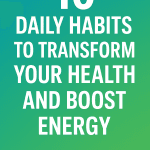In a world overflowing with unpredictability and distraction, we often look for big fixes—radical diets, life overhauls, or productivity hacks—to feel better, healthier, and more in control. But what if the real transformation isn’t found in sweeping changes, but in small, consistent actions repeated daily? That’s the profound, yet often underestimated, power of routine.
Routine is not about rigidity or monotony. On the contrary, it provides structure, stability, and freedom. When your daily actions align with your goals and values, every small step compounds into major progress. The secret to lasting wellness lies not in intensity but in consistency.
Let’s explore how building simple, sustainable routines can dramatically improve your physical health, emotional wellbeing, mental clarity, and life satisfaction—without requiring a complete lifestyle overhaul.
Why Routine Matters: The Science Behind the Structure
Routines are more than rituals—they’re biological and psychological tools that shape our lives. Studies show that routines:
- Reduce stress and anxiety by creating predictability
- Improve sleep quality and hormonal balance
- Support mental health and reduce symptoms of depression
- Enhance time management and focus
- Encourage healthier habits through repetition
Routines act as mental shortcuts. When positive actions become habitual, they no longer require willpower. This frees your mind for higher-level decision-making while embedding wellness deep into your lifestyle.
Morning Routine: Setting the Tone for Success
Your first hour sets the tone for your entire day. A mindful morning routine activates your brain, energizes your body, and cultivates focus.
Start with these small yet powerful habits:
- Wake up at the same time daily to balance your circadian rhythm
- Drink water before anything else to hydrate and cleanse
- Stretch or move to wake up your muscles and release endorphins
- Avoid your phone for the first 30 minutes to reduce anxiety
- Set an intention or gratitude focus for mental clarity
You don’t need two hours or a complex checklist. Even a 15-minute mindful morning ritual can dramatically improve your energy, mood, and mindset.
Consistent Sleep-Wake Times: The Sleep Routine Secret
We often underestimate the role of sleep in overall wellness. But research consistently shows that irregular sleep patterns can disrupt hormones, impair focus, increase cravings, and affect emotional stability.
Creating a bedtime routine that signals your body to unwind can improve:
- Sleep onset and duration
- Deep sleep cycles
- Hormonal regulation
- Recovery and cognitive performance
Ideas to include in your nightly routine:
- Dim lights and power down screens an hour before bed
- Sip herbal tea like chamomile or valerian root
- Journal to release lingering thoughts
- Practice deep breathing or meditation
- Go to bed and wake up at the same time—even on weekends
Sleep is the foundation of energy, immunity, and mood. Protect it by making your evening routine sacred.
Meal Timing and Nutritional Habits
What you eat matters—but when you eat can be just as important. Routines around meals improve digestion, reduce overeating, and regulate energy.
Healthy food routines to implement:
- Eat meals at consistent times each day
- Begin the day with a protein-rich breakfast to stabilize blood sugar
- Avoid late-night eating to support metabolic health
- Prepare meals in advance to avoid poor choices
- Practice mindful eating—no screens, no rushing, just presence
Over time, these habits condition your body to anticipate nourishment, promoting better gut health, fewer cravings, and sustained energy throughout the day.
Daily Movement Rituals: Micro-Workouts with Macro Benefits
You don’t need to become a gym rat to reap the benefits of exercise. The key to movement is consistency over intensity.
A daily movement routine might include:
- A 10-minute morning yoga flow
- A brisk 20-minute walk after lunch
- Desk stretches during work breaks
- Strength training every other day
- Dance or free movement in the evening
Regular physical activity improves not only strength and cardiovascular health, but also mental clarity, creativity, and emotional resilience.
Mental Wellness Anchors: Stress Reduction Made Simple
Your mental health thrives on predictable emotional support. By building small routines that ground and calm your mind, you improve resilience and reduce overwhelm.
Try incorporating:
- Gratitude journaling in the morning or evening
- Breathwork or meditation for 5–10 minutes
- Digital detox time blocks
- A mid-day pause or nature break
- A consistent check-in with a friend or therapist
When your nervous system learns to expect moments of rest, it begins to operate from calm instead of chaos.
Workday Routines: Productivity Without Burnout
Structure your day so your energy flows with focus, not stress. Workday routines help you stay organized, efficient, and balanced.
Techniques to explore:
- Use time-blocking to schedule deep work and breaks
- Start with a priority list, not your inbox
- End the workday with a ritual (walk, log off, shutdown routine)
- Incorporate Pomodoro technique for focused sprints
- Take consistent meal and stretch breaks
These routines reduce decision fatigue and help you work smarter—not harder.
Rituals of Joy: Cultivating Daily Happiness
Routine isn’t just for discipline—it’s also for delight. Scheduling small pleasures keeps your spirit replenished and your motivation alive.
Examples of joy rituals:
- A morning latte ritual or tea ceremony
- A nightly music or reading session
- Creative time for art, writing, or hobbies
- Gardening, cooking, or decorating mindfully
- Moments of gratitude, awe, or laughter
When you embed joy into your daily structure, you cultivate sustainable happiness—not the kind that depends on external highs, but the kind that blooms from within.
Tracking Progress and Building Momentum
To make routines stick, track your consistency, not perfection. Use journals, habit trackers, or digital apps to visualize your progress and keep motivation alive.
Tips to build momentum:
- Start with 1–2 small habits
- Anchor them to existing routines (e.g., after brushing teeth)
- Use habit stacking: add new habits to current ones
- Celebrate micro-wins weekly
- Be kind to yourself during setbacks—then resume
Habits thrive when they feel rewarding, visible, and achievable. Consistency creates identity: every time you act in alignment with your goals, you reinforce who you’re becoming.
Conclusion: Small Changes, Big Transformations
The truth is, we don’t rise to the level of our goals—we fall to the level of our systems. The power of routine lies in its ability to turn intention into action, and action into lasting change.
You don’t need a radical lifestyle overhaul. You just need small, deliberate steps repeated daily. Over time, these steps build the bridge between where you are and where you want to be.
Start today. Wake up five minutes earlier. Drink water first. Write down one thing you’re grateful for. Move your body for ten minutes. Repeat tomorrow. And the next day.
It’s not magic. It’s momentum. And it’s available to you right now.
FAQs
They provide consistency, reduce decision fatigue, and make healthy behaviors automatic, leading to long-term benefits without constant effort.
Research suggests it takes around 21 to 66 days to build a habit, depending on the complexity and consistency of the behavior.
Start small, be realistic, and use triggers or anchors. Habit stacking and visual tracking can help maintain motivation.
Yes. Routines create predictability, reduce cognitive load, and support emotional regulation, all of which help manage stress and burnout.
They should be consistent but flexible. Adapt them to your life’s rhythm while maintaining core wellness anchors.
Both are beneficial but not mandatory. Start with whichever time of day feels more manageable and build from there.








Post a comment